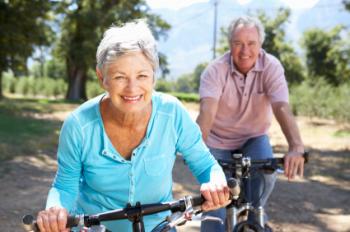It’s no surprise that exercise is good for you, and it’s probably something you’ve heard before. But studies are further proving how important exercise is in regard to aging and brain health in middle and old age.
With age often comes a lack of mobility and cognitive decline. Thankfully, we’ve begun to see that even a moderate amount of exercise makes a huge impact on combating forms of dementia like Alzheimer’s disease.
They found – with help from a few older mice – that structural changes that cause inflammation of brain tissue can be significantly reduced through running.
Age related cognitive deficits can be caused by a variety of factors, like deficiencies in blood supply to the brain or low-level inflammation. Thankfully, these two factors can be greatly reduced by simple exercise. According to Medical News Today, Gareth Howell, Ph.D. and colleagues at the Jackson Laboratory in Bar Harbor, Maine, ran several tests that helped prove this. They found – with help from a few older mice – that structural changes that cause inflammation of brain tissue can be significantly reduced through running.
Through a series of tests, they determined that age-related pericyte loss (pericyte are cells that “wrap around small capillaries and maintain the blood-brain barrier”) in the brain cortex of these mice was reduced.
Howell and his team provided 12-month-old mice (this is the mice equivalent of middle age) with running wheels. Then, at 18 months (roughly 60 years old in human years – the point where Alzheimer’s disease risk increases), they assessed the mice’s brains. Through a series of tests, they determined that age-related pericyte loss (pericyte are cells that “wrap around small capillaries and maintain the blood-brain barrier”) in the brain cortex of these mice was reduced. Other indicators of dysfunction were also greatly lessened.
Suffice to say, some form of aerobic exercise – be it jogging, swimming, hopping on a stationary bike, step aerobics, or Zumba – can work (scientific) wonders during middle and old age, specifically in regard to brain health.
Howell sums it up nicely, “As a society we need to work hard to ensure we maintain an active lifestyle wherever possible. In this day and age, with so many distractions and conveniences, it is easy to fall into a lifestyle that does not include enough exercise.”

 Exercise and Aging – Why They Should Go Hand-in-Hand
Exercise and Aging – Why They Should Go Hand-in-Hand



 “In Case You Don’t Live Forever” by Ben Platt
“In Case You Don’t Live Forever” by Ben Platt
 Our Monthly Tip: Make an “In Case of Death” File to Ease Loved One’s Grief
Our Monthly Tip: Make an “In Case of Death” File to Ease Loved One’s Grief
 Passing of Beloved Comedian Births a New Comedy Festival
Passing of Beloved Comedian Births a New Comedy Festival














